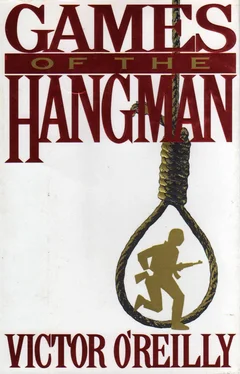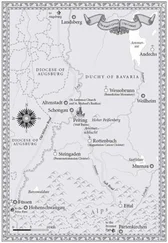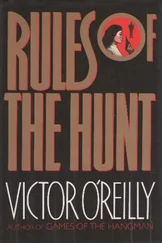Victor O'Reilly - Games of The Hangman
Здесь есть возможность читать онлайн «Victor O'Reilly - Games of The Hangman» весь текст электронной книги совершенно бесплатно (целиком полную версию без сокращений). В некоторых случаях можно слушать аудио, скачать через торрент в формате fb2 и присутствует краткое содержание. Жанр: Триллер, на английском языке. Описание произведения, (предисловие) а так же отзывы посетителей доступны на портале библиотеки ЛибКат.
- Название:Games of The Hangman
- Автор:
- Жанр:
- Год:неизвестен
- ISBN:нет данных
- Рейтинг книги:4 / 5. Голосов: 1
-
Избранное:Добавить в избранное
- Отзывы:
-
Ваша оценка:
- 80
- 1
- 2
- 3
- 4
- 5
Games of The Hangman: краткое содержание, описание и аннотация
Предлагаем к чтению аннотацию, описание, краткое содержание или предисловие (зависит от того, что написал сам автор книги «Games of The Hangman»). Если вы не нашли необходимую информацию о книге — напишите в комментариях, мы постараемся отыскать её.
Games of The Hangman — читать онлайн бесплатно полную книгу (весь текст) целиком
Ниже представлен текст книги, разбитый по страницам. Система сохранения места последней прочитанной страницы, позволяет с удобством читать онлайн бесплатно книгу «Games of The Hangman», без необходимости каждый раз заново искать на чём Вы остановились. Поставьте закладку, и сможете в любой момент перейти на страницу, на которой закончили чтение.
Интервал:
Закладка:
The man had long since conceived the outline of the idea. It had struck him that unrest in the world presented an unparalleled opportunity for commercial exploitation. At Harvard, studying for an M.B.A., he had written, as he had been trained to, the business plan. It featured a specific financial objective; the acquisition of a personal fortune of one hundred million dollars within fifteen years.
More than twelve years had passed, and he was still only halfway to his objective: he had averaged something over four million dollars a year, taking the rough with the smooth, so a straight-line projection pout him something like forty million dollars short by the close of his allocated period, May 31, 1983. Clearly something would have to be done; a bold stroke was called for. Allowing a surplus for inflation and unforeseen expenses, he would aim to clear fifty million dollars from one major action, and then he would retire. He would be two years ahead of schedule.
Felix Kadar had another motive for wishing to achieve his financial objective ahead of time. He had made a specialty of carrying out his work through different organizations and under different identities, and he was expert in modifying his appearance and personality. Nonetheless, it seemed to him that it would only be a matter of time before one of the Western antiterrorist units started putting the pieces together. And, he admitted to himself, he had allowed his ego to get he better of him recently.
He had played games with the authorities. In the knowledge that he had never been caught or even arrested and was soon to retire, he had deliberately increased the risks of living on the edge. That must stop. Mistakes would be eliminated.
The seventy-one men and women in the attack force were all known to him either personally or by reputation. He had compiled a list of suitable candidates over the years and had made full use of the extensive files of terrorists maintained by the KGB. He kept up the friendliest of relations with Ahmed Jibril, the Palestinian ex-captain in the Syrian Army who was one of the KGB's most active agents inside the various Palestinian movements.
He used fingerprints and other personnel data accumulated in the KGB and his own files to vet each candidate rigorously. Kadar was particularly concerned about infiltration – a specialty of the Israelis, many of whom spoke Arabic and were in appearance indistinguishable from Yemenis and North Africans. The classic ploy of the Israelis was to substitute one of their own for one of the fedayeen killed or captured in action against them. It was not so difficult to do, and hard to detect when the Palestinians were scattered among a dozen countries. Today Kadar believed he had caught such a man. He was not absolutely sure, but then he didn't have to be. Within the camp Kadar's will was absolute law; he was judge, jury, and, if it so pleased him, executioner.
The assembled terrorists were drawn up in two ranks in a semicircle facing Kadar. It was night, and the dusty parade ground was brightly lit with powerful floodlights, though Kadar himself was in shadow. To one side a shapeless figure was spread-eagled against a metal frame embedded in the hard ground.
Kadar was further concealed by an Arab headdress made of camouflage material; his mouth and nose were covered, and his eyes were hidden behind sunglasses. Though some of his people had worked with him before, none had ever seen his face or knew his real name. They knew him as a hooded figure, a voice, and a consummate planner. The implementation was almost always left to others.
"Brothers and sisters," he said, "followers of the Revolution. For years you have been fighting to destroy the Jews and to free your native land. You have fought in many glorious battles and have killed many of your enemies, but always final victory has eluded you. You have been cheated out of what is your due not just by the accursed Israelis but by the support they receive from godless America and the might of Western imperialism. You have been brought to this camp to train and prepare for an action directly targeted at the soft underbelly of the decadent West. Your deeds will echo around the world, and the pain and shock of the rulers of the West will be terrible."
There were shouts and applause from the guerrillas. Several fired automatic rifles in the air in a display of enthusiasm. Kadar thought he had spent enough time on the ritual condemnation of Israel and the West. It was time to deal with more practical matters. Terrorists – at least Kadar's pragmatic kind – didn't fight on idealism alone. They liked to be paid in hard currencies.
"Fellow freedom fighters," he continued, "this is not yet the time for me to tell you the precise details of our mission. For reasons of security you will all understand, that information must be withheld until shortly before the day of action. Meanwhile, though you are all experienced and battle-hardened veterans, you will be trained to a peak of even greater combat effectiveness. As you do this, you may care to reflect not only on the glory that will be attained from this mission but on the one hundred thousand American dollars you will each receive upon its successful completion."
This time the applause was considerably more enthusiastic. There were further bursts of Kalashnikov fire. Kadar reflected that experienced and trained by the liberation camps though his men might be, too many of them had become lax and overemotional in their reactions. The raw material was there, but it needed to be subjected to ruthless discipline if his plan was to succeed. His orders must be followed unhesitatingly; obedience must be absolute. The only way to achieve this within the limited time available was to instill a terrible fear of the alternatives. He had dangled the carrot in front of them; now was the time for the stick. He had stage-managed the demonstration for maximum impact.
He held up his hand for silence, and the cheering ceased. He spoke again. "Brothers and sisters, we are faced with implacable enemies. Our war is unceasing. Constantly they try to destroy us. They send their warplanes against us; they raid us from the sea; they fill the airwaves with their foul propaganda; they manipulate the media to distort the truth of our cause; they send spies and sowers of discord among us."
There was a ripple of reaction from the ranks of fighters: fists were shaken; weapons were raised in the air.
"Silence!" he shouted. A hush fell over the terrorists. The group was still. They were used to savage and sometimes arbitrary discipline but also to the informality and frequently free and easy life of guerrilla units that, whatever they boasted to their womenfolk, spent little of their time in actual combat. They sensed that this mission would be different.
Kadar raised his right hand. Instantly the floodlights illuminating the parade ground were extinguished. The group was gripped by fear and an awful curiosity. Something terrible was about to happen. It would concern the figure spread-eagled on the metal frame, but what it might be nobody knew. They waited.
Kadar's voice came out of the darkness, hard, ruthless, and resonant with authority. "You are about to witness the execution of a Zionist spy who foolishly attempted to infiltrate our ranks. Watch and remember!" His voice rose to a shout and echoed around the parade ground.
A single spotlight came on and illuminated the figure stretched out on the frame. He was naked and gagged; his eyes bulged with fear. A tall man in the white coat of a doctor came out of the darkness. He had a syringe in his hand. He held it up in front of him and pushed the plunger slightly to clear the needle of air; a thin spray of liquid could be clearly seen by the onlookers. Carefully he injected the contents of the syringe, then stood back and consulted his watch.
Читать дальшеИнтервал:
Закладка:
Похожие книги на «Games of The Hangman»
Представляем Вашему вниманию похожие книги на «Games of The Hangman» списком для выбора. Мы отобрали схожую по названию и смыслу литературу в надежде предоставить читателям больше вариантов отыскать новые, интересные, ещё непрочитанные произведения.
Обсуждение, отзывы о книге «Games of The Hangman» и просто собственные мнения читателей. Оставьте ваши комментарии, напишите, что Вы думаете о произведении, его смысле или главных героях. Укажите что конкретно понравилось, а что нет, и почему Вы так считаете.











